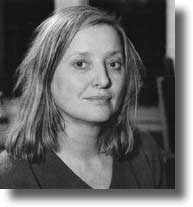

Helma Sanders-Brahms was born in Emden on November 20, 1940. She studied English, German, and acting and began working as a teacher. She learned filmmaking while working as an intern for Italian directors Sergio Corbucci and Pier Paolo Pasolini, and she also collaborated with theatrical directors Luc Bondy and Ariane Mnouchkine on stage productions. When she was 29, she made her first film, Angelika Urban, Salesgirl, Engaged (Angelika Urban, Verkaeuferin, verlobt, 1970), which was a short social documentary. This film won her two awards at the Oberhausen Short Film Festival. She continued to make over twenty more films, usually attempting to tell the history of Germany from her own viewpoint in the present. Her films include The Beach Under the Pavement (Unter dem Pflaster ist der Strand, 1974), Shirin's Wedding (Shirins Hochzeit, 1975), Heinrich (1976), No Mercy, No Future (Die Berührte, 1981), The Future of Emily (Flügel und Fesseln, 1984), Laputa (1986), Apple Trees (Apfelbäume, 1992), and My Heart is Mine Alone (Mein Herz Niemanden, 1997). Sanders-Brahms was made internationally famous with her film Germany, Pale Mother (Deutschland bleiche Mutter, 1980). She has won many international film awards and been given several artistic honors, including membership in Berlin's Academy of Fine Arts, recipient of France's Chevalier des Arts et des Lettres, and bearer of Japan's Yasue Yamamoto Award for Artistic Achievement in Film and Theatre. Currently, Helma Sanders-Brahms is one of Germany's best-known female film directors.



